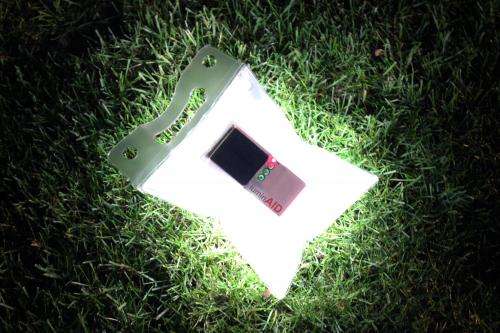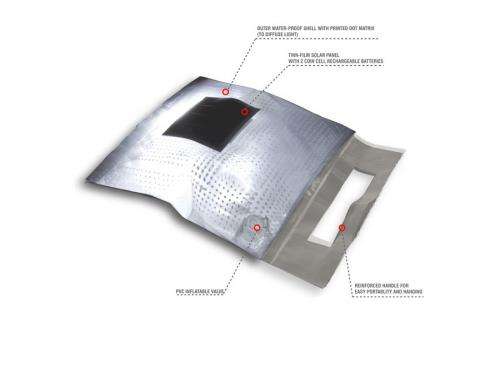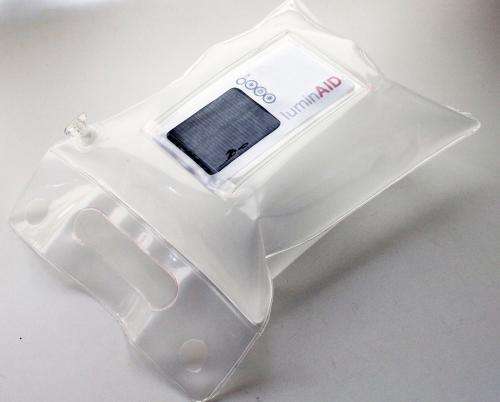(PhysOrg.com) -- World populations who live without electricity including those in disaster-stricken areas in the wake of floods, earthquakes, and other calamities are who two Columbia University graduates want to help. That is why they have launched their campaign to deliver their solar-rechargeable lamp that packs flat and inflates to create a lightweight, waterproof lantern.
Anna Stork and Andrea Sreshta, graduates from the Columbia Graduate School of Architecture, Planning & Preservation, have a goal to bring their solar-powered pillows to victims of disasters as well as the world’s needy. Their design, LuminAID,at first glance looks like a small boutique store carrier bag with a handle.
LuminAID is actually an inflatable plastic pillow with a thin solar panel and two coin cell batteries. The package can be inflated and deflated down to where it can be packed completely flat. Photovoltaic film is laminated to polyethelenevinyl acetate plastic. The LuminAID device inflates to produce a quality of light similar to a lantern. A white-dot pattern on the device diffuses the light.
It’s good for up to four hours of lighting at 35 lumens, or up to six hours at 20 lumens. The four hour setting, which is “High,” is designed for reading and task work. The six hour setting, which is “Low,” can provide households without electricity the light they need for safety or as a simple night light.
Four to six hours of sunlight are required for charging. The battery can be charged 800 times.
Stork and Shreshta consider the lamp as a good alternative to dangerous kerosene lamps, which many global households with no access to electricity continue to use. Stories surface of small children and adults seriously burned from falling kerosene lamps or from lamps accidentally overturned. The LuminAID broader mission is to just bring light in an affordable size and design to those who need it.
Their plan to engineer the effort includes a “Buy One, Give One” concept. The LuminAID light is to sell for $25 (suggested uses are for travel or camping).
Money which the LuminAID Fund collects will go to sending the lights to needy sites around the world. Desirable purposes for the light are so that families can read, write, and cook, so that students can study longer, and businesses can stay open later, as well as for disaster relief.
As a field test, LuminAID is working with organizations to distribute the light in Rajasthan, India, where they say one in two households lack electricity. The LuminAID lights will be used in rural schools, homes and by small-business owners.
When the campaign ends, say the two LuminAID co-founders, they will place an order with their manufacturer. They say they expect to ship all pledge packages to backers by January 2012.
More information: www.luminaidlab.com/
© 2011 PhysOrg.com






















